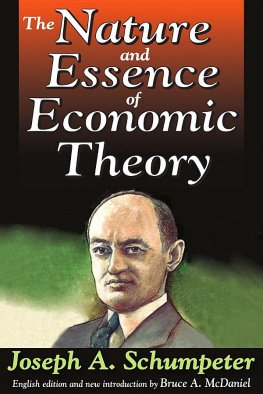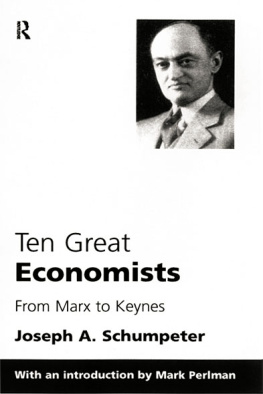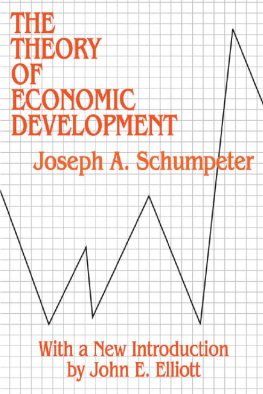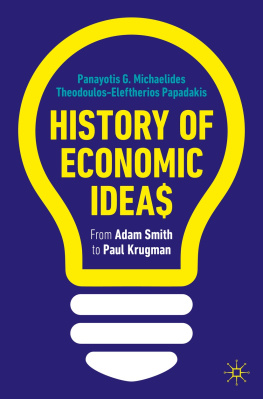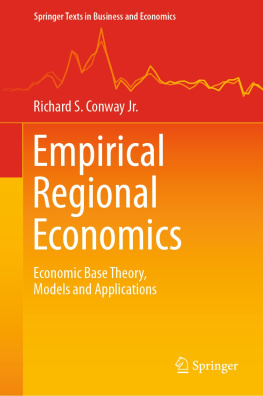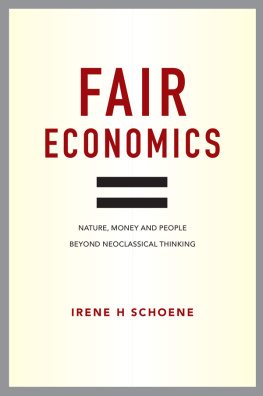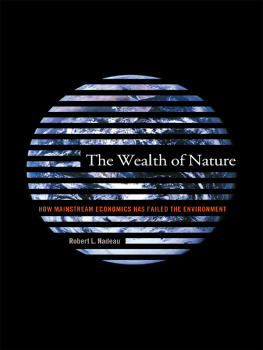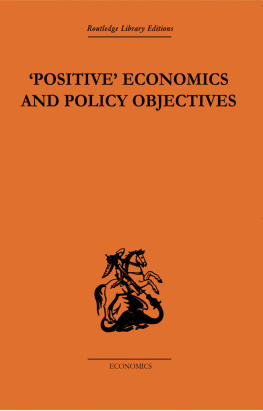This book is dedicated to
Ms. Johanna von Keler
Widowed Schumpeter
Preface
The following saying makes a lot of sense: To understand is to forgive. Better even: Whoever understands sees that there is nothing one has to forgive. And that is also true in the field of knowledge.
The layman sees perfection in the body of knowledge at his time. Axioms of former systems he sees as wrong. For example, the wrong Ptolemaic system has to make room for the correct Copernican one, which is accepted now. If he would see that even the most modern theory is nothing but a temporary frameworkto be replaced sooner or later by new descriptions (because sciences are nothing else than that)he would lose faith in science. The term failure of science describes perfectly the impression that a lot of people have of this insight. In our area, that is not only the standpoint of laymen. While physicists and mathematicians are like well-trained soldiers who stay in their foxhole even when the battle turns ugly, our authors do not display such steadfastness. This might be a sign of the relative young age of the social science that its representatives rather easily change directions and often ignore previous work in the area. It also seems that scientists in our area tend to ignore commonalities and rather stress differences, to the point that reforms are pushed through as radically as possible, or in other words: That one prefers a totally new construction instead of building onto an existing foundation. Therefore, the contrasts in our field seem to be so insurmountable, not only between the various directions but even in the underlying theory which will be discussed in this book.
This is not my standpoint, though. Like so many of my colleagues, I agree that each direction and every individual author is right with his claim: Compared to the aim or purpose of each claim, there are few that make no sense and can be dismissed as wrong. We may have reason to prefer a different viewpoint but that usually does not give us the right to dismiss the one that is opposed to ours. The old idea has fulfilled its function and a new one might not even be possible without the previous one. To think a thought all the way through is important, even if it turns out in the end that it was utterly useless. But most of the times we can gain something out of any theory.
We would like to work hard to understand and appreciate each and any of them, especially by spelling out their underpinnings, which are often neglected even by their authors. And then most of the times we find that the ideas are absolutely logical and any controversy would be mute. We want to understand, not fight; learn, not criticize; analyze and find what is correct in each sentence, not just simply accept or dismiss.
We not only want to do this with different opinions within the theory but also with the different directions of economics and we will always stress that there are absolutely no dichotomies, in the sense that one might be worthless and the other one correct. In this way we do not share the partiality of most economists, but are absolutely willing to do justice to everybody, as long as we understand them. And today we are not alone with this viewpoint. But there is a point that makes understanding difficult in our field; and that is the problem that the researcher is at the same time politician and that his research is very often not unbiased; but we believe that theory and practice not only can be separated but they actually do not have anything in common. Even if you do not agree with us in this point, you could not disagree with us when we say that the quarrel between pure theory and history is a thing of the past. In any case, we do not want to be part of it and rather investigate in each separate case, whether the one or the other methods of investigation should be preferred. This way, we will not get to an all-encompassing answer but to separate ones for each individual case.
So, this book is not partial. The reader will find absolute composure in this book. We do not follow any type of scientific or political dogma. It would not have been difficult for me to write exactly the opposite of what you read here, if I would have thought it to be correct. And why not? I am far away from any practical politics and only try to find understanding; and there is no reason for me to prefer one specific method or different materials from the ones I used. If they would better lead to my goal, there would not be any reason to stick to my previous ways. On the contrary, it would be a pleasureand I would expect a lot of stimulation and satisfactionto switch to a different method and gain additional knowledge.
And I also do not care where an axiom that I support came from, what the origins of theories or directions are. It is the task of the dogma historian to be just in this casewe care about the problems not the persons. Just in order to be clear, I do talk about Ricardos Systems or the Austrian School etc. because these are common expressions. Everybody knows right away what is meant by them without having to go into long, intricate descriptions, although they might be more correct.
On the other hand, in order to fully understand a theorem we must understand its dogma-historical background. But we cannot and we will not strive for perfection in this regard. Since this book is not geared towards the beginner or layman, we expect the reader to have a certain background knowledge of our science and will understand my abbreviated outlines. Only with a rather exact previous knowledge base of our science the reading of this book will be fruitful. I have to stress, though, that unfortunately beginners in our field all too often do not have this background of all aspects of our science and its theory due to the fact that they specialize too early. I had to write the way I did in order to prevent this book from becoming too unwieldy. For example, when I talk about the Boehm-Bawerk Theory, I do not go into all its details. All the theorys elements will be discussed but that will not be sufficient for a full understanding if the reader of this book has not also read the original work. But I will pay special attention to my German audience by providing as much background information as possible in an area, which they might not know as well.
In general I try to avoid citations and names as much as possible. Here I follow the English tradition, which seems to have a lot of advantages: completeness in the discussion of the literature is impossible and it is unjust to praise or blame individual writers. The reader has to know which approaches or lines of thought are being discussed when we use the phrases a popular theory or it is often saidindividual writers do not play a role here. And the reader will also have to be able to judge what in this book is an original idea and what is just a summary of previous knowledge. If someone finds common knowledge, which I thought to be my own original thought ... that would only make me happy.
The work of the latter grows organically out of the work of the former and I happily cling to the old views where it is possible. The less new we have to do the better. The author of this book seems to be closest to L. Walras and von Wieser.
Although you will not find many names mentioned in this book, it nevertheless contains most ideas of the current science of theoretical economics, and it therefore gives a complete overview of our discipline. I hope I have included all points of departure for further development. It was always my aspiration not to deconstruct but to develop our field further. Any exact science has to build its rocky path, step by step, and not care that the general public sees our efforts as insignificant. Unfortunately, that does not happen enough in our areaoften it seems every new book wants to found a new economy. That will improve with the maturation of our discipline. We want to remember and appreciate all the previous work in our field but also not deny that there is a lot more left to do. The number of basic thoughts is small; quite a fewbut not all yetare complete.

